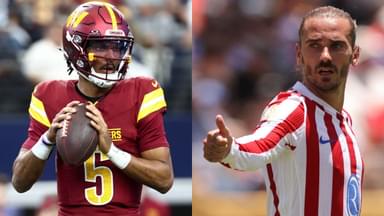Washington Commanders head coach Dan Quinn is facing a barrage of criticism after star quarterback Jayden Daniels dislocated his elbow late in Sunday night’s 38-14 loss to the Seattle Seahawks. Daniels was injured on a scramble to his right from the Seahawks’ 4-yard line when his left elbow bent awkwardly while being tackled.
Advertisement
The injury, diagnosed as a dislocation, will keep the rookie out “for a while,” according to Quinn. During his Monday press conference, the HC also admitted that, in hindsight, Daniels shouldn’t have been in the game at that point.
“Honestly, man, that’s where I missed it,” Quinn said. “Of course, he could scramble — it’s Jayden. It’s what he’s special at. And that’s 100 percent on me.” But as one former NFL safety asked, was it really Quinn’s fault, or is the outrage overblown?
According to Nick Ferg, the flak Quinn is facing is simply the result of a double standard in how fans and analysts react to player injuries and coaching decisions across the league. In a video breaking down the sequence, the former safety defended Quinn’s controversial choice to keep Daniels in the game late into the fourth quarter.
“The score is 38–7 in the fourth quarter, seven minutes and 39 seconds left. The Commanders are right there on the five-yard line getting ready to score,” said Ferg.
“No one was saying anything about why Jayden Daniels was still in the game, not the commentators, not the fans. But as soon as he got hurt, suddenly it’s Dan Quinn’s fault,” he added, noting that Daniels’ situation wasn’t unique this season.
Around the league, several starting quarterbacks have remained in blowout games deep into the fourth quarter, mostly getting away with it.
“Seattle Seahawks’ Sam Darnold was still in the game too… Josh Allen was still in when it was 30–6 against the Jets… Jared Goff and Caleb Williams were both playing when it was 45–21. Sam Darnold stayed in during a 31–7 game…Even Geno Smith and Daniel Jones were still on the field in a 40–6 game,” said Ferg. “If we’re going to make a stink about one, we should be talking about all of them.”
Ferg also pointed out the “lose-lose” dynamic facing coaches like Quinn: Pull a young quarterback too early, and critics accuse him of quitting; leave him in too long, and he’s blamed if any injury occurs.
“If Dan Quinn had taken Daniels out, people would’ve said he gave up,” the analyst said. “If he leaves him in and something happens, it’s his fault.”
According to ESPN Research, Daniels was pressured on a career-high 51% of his dropbacks on Sunday, including 61% in the second half. He was hit 14 times, the second-most this season (he had absorbed 17 hits in Week 2 against Green Bay). Those hits earlier in the game left him with a sprained knee, part of a growing list of injuries that have limited his availability this season.
Quinn said the drive that led to his latest injury was meant to be the final series for Daniels and several other starters, and that the offensive plan didn’t include designed quarterback runs. Daniels’ scramble, however, came on a broken play — exactly the kind of situation Quinn wanted to avoid.
“The hindsight part is the hardest one,” Quinn said. “That’s what I think about all night and nonstop.”
An X-ray of Daniels’ elbow after the game showed no fracture. But Washington will now turn to veteran Marcus Mariota to start, with Josh Johnson as his backup. Quinn said the team has no immediate plans to sign another quarterback.





